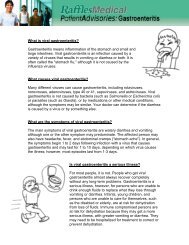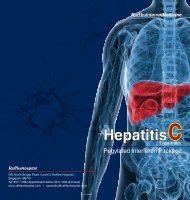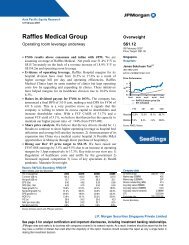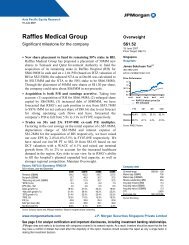Cancer You - Raffles Medical Group
Cancer You - Raffles Medical Group
Cancer You - Raffles Medical Group
You also want an ePaper? Increase the reach of your titles
YUMPU automatically turns print PDFs into web optimized ePapers that Google loves.
<strong>Raffles</strong> HealthNews Feature 21The multi-taskerIf you were told that you had advancedcolorectal or ovarian cancer which hadmetastasised and spread to other nearbyorgans like the liver or peritoneum (themembrane lining covering all the organswithin the abdominal cavity), you wouldnot be faulted for imagining a bleakprognosis. Most patients often assumethe worst when they learn that the cancerhas spread.Dr Tan Yu-Meng, Specialist in GeneralSurgery and <strong>Cancer</strong> Surgery &Consultant, <strong>Raffles</strong> Surgery Centre hasa special interest in dealing with thisgroup of patients. Furthermore, he has atreatment plan which provides some hopeand even the chance of living for anotherfive years or more.Such treatment however, requires achange in mindset from the conventionalway of handling such problems as wellas a unique set of skills. While combiningsurgery and chemotherapy /radiotherapyis not new, it is often done for palliativepurposes. Yet, if a cancer can becompletely removed, then there is hopefor a cure.Traditionally, chemotherapy andradiotherapy would be used to shrinka tumour as much as possible beforesurgical excision is employed to removethe remainder. This however haschanged. Chemotherapy is still used firstbut only to test the effectiveness of thedrugs before removing most of the tumourvia surgery. Then, the remaining tumour iscompletely eradicated with chemotherapy.This is quicker, more effective and haslower risk of developing chemotherapyresistance.This concept, along with a specialsurgical procedure, can also be extendedto cancer that involves the nearby organsor the peritoneal lining. As peritonealmetastases from abdominal cancer is adreaded diagnosis with an even poorerprognosis, this spells tremendous hopefor this group of patients.This challenging procedure, called aperitonectomy, sees Dr Tan operating andremoving almost all of the peritoneum,until all the visible cancer is removedfrom the involved organs. Once done,the abdominal cavity and the organs areexposed to chemotherapy heated to 42degrees Celsius. Thus, all necessarytreatments are confined to one surgicaloperation and the chemotherapy,delivered in this way, is also much moreeffective.Peritonectomies are especially usefulfor advanced abdominal cancers ofgastrointestinal (especially appendicealand colorectal cancers) and ovarianorigin. However, Dr Tan concedes thatsuch an operation is not suitable for alltypes of patients. Patients need to berigorously assessed by a specialisedmultidisciplinary team before they canbe considered for this. Some factorsinclude the patient’s capability to undergochemotherapy as well as the stress of longhours of surgery.Nonetheless, Dr Tan remains unfazed.Such aggressive treatment of this typeof advanced stage cancer actually seesa significant percentage of patientsmaking it to five years or longer,whereas conventional treatment of justchemotherapy alone would only see veryfew survive for so long.Dr Tan concludes, “While the peritonectomycan only help a small group of patients sofar, it is still heartening to learn that thereis hope for patients with such dire medicalconditions. It is even more encouragingknowing that the same approach forthis procedure may be applied to otherabdominal cancers.”The future of cancer surgeryThe prospects and future of cancer patients certainly seem much brighter with the advent of new technology and proceduressuch as those mentioned earlier. <strong>Cancer</strong> surgery is therefore able to cover much more ground than it was able to. Yet thebar can be pushed even further, when surgery is coupled with chemotherapy and radiotherapy forming an all-rounded typeof treatment.While this is not the case for all types of cancer, there are obvious benefits to such an approach. Dr Choy elaborates, “Evenwith advances in brain tumour surgery, sometimes tumours cannot be entirely excised due to its delicate location. When thisoccurs, patients require add-on chemotherapy and/or radiotherapy to be entirely tumour free.”This sentiment is also echoed by Dr Tan Yu-Meng,” The advances in the field of peritonectomies are only possible due to theclose cooperation of an oncologist and a surgeon and their intimate understandings of how cancer tumours work. Therefore,it is my hope that the future will see more of such partnerships leading to better understandings of such a cancer approachfor the benefit of patients.”Ultimately, it is important to understand that there is no perfect treatment to cancer nor is there one vastly superior toanother. <strong>Cancer</strong> treatment is tailored to the individual and all this information presented serves to drill home one importantmessage: Having cancer does not mean a death sentence anymore. Keep up the good fight to keep living. HN
















